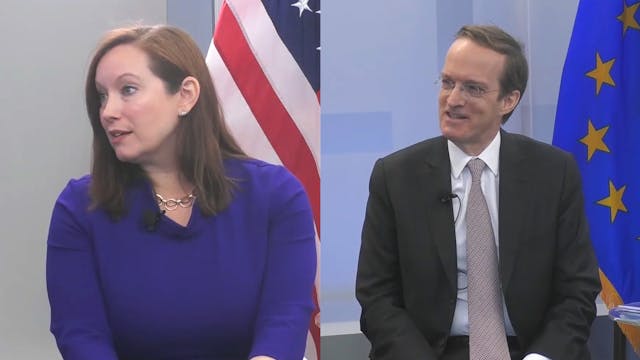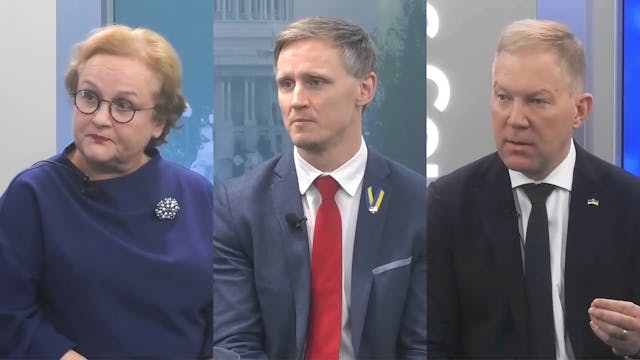Prime Minister of Estonia H.E. Kaja Kallas on digital infrastructure and China
Europe Center
•
14-Jul-2021
TRUSTED CONNECTIVITY: SECURING DIGITAL INFRASTRUCTURE IN AN ERA OF STRATEGIC COMPETITION WITH CHINA - The Atlantic Council hosted the second event in our forum “Trusted Connectivity: Securing Digital Infrastructure in an Era of Strategic Competition with China,” featuring the Prime Minister of Estonia H.E. Kaja Kallas, Representative Ro Khanna (D-CA 17th District), and NSC Senior Director for International Economics and Competitiveness Peter Harrell. This event, co-hosted by the Scowcroft Center for Strategy and Security and its Forward Defense practice area, the Digital Forensic Research Lab, the Europe Center, the GeoEconomics Center, and the GeoTech Center, took place on July 14, 2021.
In an era defined by both revolutionary technological advancements and accelerating geopolitical competition, modernizing global infrastructure is not only a profound economic opportunity but also a key security imperative. Our June 2021 #ACFrontPage event, featuring President of Estonia H.E. Kersti Kaljulaid and US Deputy National Security Advisor for Cyber and Emerging Technology Anne Neuberger, introduced the concept of “trusted connectivity” as a strategic framework for democratic nations to incentivize ambitious and interconnected infrastructure projects among the private sector, and to provide a viable alternative to authoritarian efforts like China’s exploitative Belt and Road Initiative. Yet there remain significant hurdles to implementing this framework. Technological and legal standards, industries and the products they develop, and visions for the future of economic vitality, societal resilience, and national security are not aligned among many democratic nations. If trusted connectivity is to serve as a key pillar alongside existing US and allied initiatives like Build Back Better World, the Blue Dot Network, and the US Innovation and Competition Act, the United States and its allies and partners need to overcome these obstacles along the path to trusted global infrastructure.
In advance of the Tallinn Digital Summit this September, Prime Minister of Estonia H.E. Kaja Kallas joined the Atlantic Council to discuss how the United States, European nations, and their respective industries should collaborate through policy, law, and market forces to build trusted connectivity into their emerging digital and physical infrastructure, using the Three Seas Initiative as a foundational example. Prime Minister Kallas was joined by Representative Ro Khanna, who shared how the imperative to invest in secure digital and physical infrastructure relates to key legislative initiatives like the US Innovation and Competition Act, and NSC Senior Director for International Economics and Competitiveness Peter Harrell, who addressed the nexus of economics, security, and statecraft and explored how democratic governments can better incentivize the private sector to invest in ambitious infrastructure projects, especially in the face of a Chinese system that allows its government to heavily influence its companies.
ORIGINAL AIRDATE: 07/14/21
Up Next in Europe Center
-
The US and Poland: A transatlantic pi...
THE US AND POLAND: A TRANSATLANTIC PILLAR IN AN ERA OF VOLATILITY AND WAR - The Atlantic Council’s Europe Center hosted a Warsaw-based public event on “The US and Poland: A transatlantic pillar in an era of volatility and war.”
Russia’s invasion of Ukraine has unleashed aggression on the Europ... -
The EU Strategic Compass and EU-US de...
ORIENTING EUROPEAN SECURITY: THE EU STRATEGIC COMPASS AND EU-US DEFENSE COOPERATION - Putin’s unprovoked and unjustified invasion of Ukraine is upending the European security order and leading to a re-evaluation within the European Union as to its role as a security provider. The EU Strategic Com...
-
Baltic perspectives on Russia
BALTIC PERSPECTIVES ON RUSSIA - Russia’s full-scale invasion of Ukraine marked a turning point in the post-Cold War world order, forcing Europe and the West to urgently reflect and reassess our shared security posture. While NATO allies have reinforced the Alliance’s Eastern flank over the past e...



